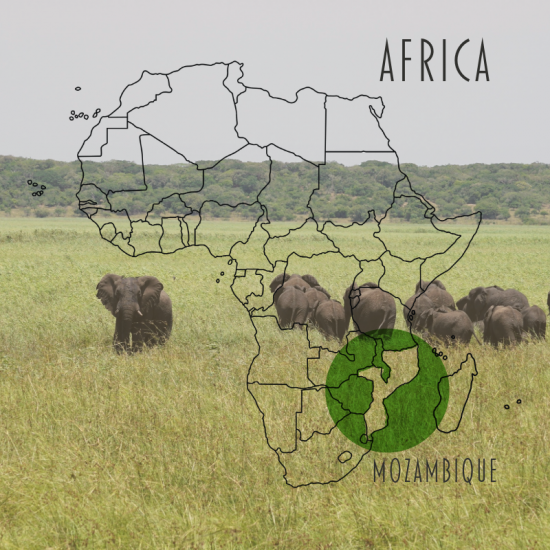

Mozambique is a country located on the southeastern coast of Africa sharing borders with Tanzania to the north, Malawi, Zambia, and Zimbabwe to the northwest, Swaziland and South Africa to the southwest, and the Indian Ocean to the east. While the country faces various challenges, it is also rich in resources and has huge potential for sustainable tourism development.

Mozambique was a Portuguese colony until it gained independence in 1975 and experienced a long and devastating civil war that lasted until 1992. In the UN’s Human Development Index, Mozambique is currently ranked number 185. Challenges that the country faces include poverty, insufficient healthcare, access to education and limited infrastructure, although efforts are being made to attract foreign investment and develop key sectors. At the same time, natural disasters such as cyclones, floods, and droughts regularly cause significant damage to infrastructure, also displacing communities. Various actions are taking place towards the betterment of the situation and the achievement of the UN SDGs, with the current progress available on the Sustainable Development Report Dashboard.
Overall, Mozambique demonstrates enormous potential – it is a country rich natural resources, including natural gas, coal, and minerals, with agriculture also playing a vital role in the economy. Mozambique’s touristic potential is substantial, with a coastline of 2700 kilometres and rich in cultural heritage, flora and fauna. Nevertheless, it does not yet experience a large share of the tourist market, with the situation having become even more challenging in times of COVID-19. In addition, the sector is still hugely dominated by foreign investment, mainly from South Africa, contributing little to the balance of payments and poverty alleviation in the country.
Rural tourism in Mozambique remains a particularly neglected field with tourism activity to date largely focused on “sun sea sand” holidays. This lack in rural tourism development goes hand in hand with a lack in HE training to develop rural and sustainable tourism, with nearly no courses in the country focused on rural areas, particularly at MA level. To date, there is still no tourism degree at postgraduate (PG) level in Mozambique. However, communities – particularly in rural areas – can significantly benefit from tourism development, not just on the African continent. In Austria, a destination well-known for its best practise examples of rural tourism (which this project aims to share), (agri)tourism is seen as essential income generator. In the case of Mozambique, CBT, agritourism and similar forms of tourism bear underused potential for linkages and livelihood diversification particularly in rural areas dominated by agricultural production.
CAST Mozambique therefore strives to improve rural livelihoods, particularly the younger and female population’s future perspectives. It does so through creating HE initiatives that not only enable students to learn about the issues and sustainable development of tourism in those areas, but where communities are also supported through assistance in developing viable sustainable tourism businesses and marketing strategies, so to utilise tourism’s full potential to contribute to the SDGs, alleviate poverty in Mozambique, and empower residents.
